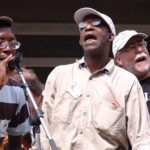WACO—Congregational singing penetrates the hearts of worshippers in ways sermons or private devotional exercises cannot, Bible scholars told participants at a Baylor University conference May 8.
“Music is the main way we get the gospel into people’s hearts,” said Sharyn Dowd, associate professor of New Testament at Baylor University.
| Sharyn Dowd, associate professor of New Testament at Baylor University. |
Dowd participated in a panel discussion during a symposium on the renewal of congregational song, sponsored by Baylor’s Center for Ministry Effectiveness & Educational Leadership.
As professor of preaching and Christian scriptures at Baylor’s Truett Theological Seminary, Hulitt Gloer acknowledged he found it painful to admit, but he agreed the shared experience of congregational singing makes its mark on hearts in ways sermons do not.
Hymns sung in church not only teach theology, but also develop character, he insisted.
“The first book of theology I ever had was the hymnal,” he said. “Its truth penetrated not just my mind but my heart. It moved beyond the cognitive to the experiential—an experience of truth.”
The words of a children’s song—“Jesus loves the little children, all the children of the world; red and yellow, black and white, they are precious in his sight”—profoundly shaped his views on race relations at an early age, Gloer noted.
“That song was prophetic in nature, speaking to a 5-year-old boy growing up in Atlanta, Ga.,” he said.
Congregational singing draws much of its impact out of the shared experience, Dowd added.
Sign up for our weekly edition and get all our headlines in your inbox on Thursdays
“The concept of Christian community is strengthened by congregational song,” she said.
That idea marks a central theme of Scripture, Gloer noted.
“We are in this together as community,” he said. “The Bible is all about community—people living together … working together … singing together in the presence of God.”
Praise becomes possible in the context of community that may be difficult, or even impossible, for an individual who is going through a tough time, he added.
“I need the community to voice my praise sometimes when I cannot voice it—when it is too heavy for me,” he said.

Hulitt Gloer, professor of preaching and Christian scriptures, Truett Seminary.
|
Worshippers who deride all contemporary praise music as repetitious and therefore shallow miss an important point about the value of repetition, Dowd noted.
“Repetition has, over the centuries and in every religion, been crucial to centering a group of people together on worship,” she said. When the New Testament book of Acts describes the early church as being in “one accord,” she suggested that meant, in part, worshippers were “centered on the presence of God.”
Congregational song allows worshippers to “express deepest gratitude to God for his gracious work,” and it provides a vehicle to teach and challenge Christians to follow Christ’s teachings, Gloer said.
No single hymn or chorus can teach every Christian doctrine, but worship leaders should strive to serve a balanced diet of instruction through the songs they select, said panel moderator Randall Bradley, director of Baylor’s Center for Church Christian Studies.
“Not every song has to possess a fully orbed theology, but within a service, our goal should be to present a more complete picture,” Bradley said. “We should offer a complete diet over a period of time.”















We seek to connect God’s story and God’s people around the world. To learn more about God’s story, click here.
Send comments and feedback to Eric Black, our editor. For comments to be published, please specify “letter to the editor.” Maximum length for publication is 300 words.